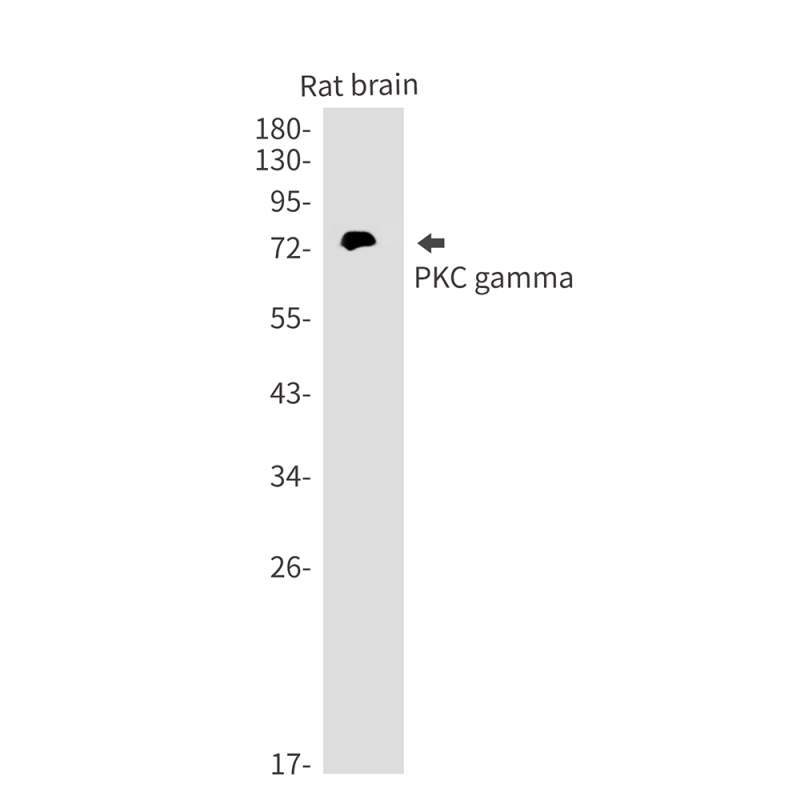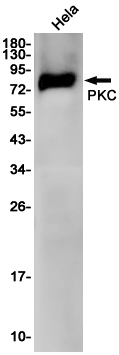

| WB | 1/500-1/1000 | Human,Mouse,Rat |
| IF | 1/20 | Human,Mouse,Rat |
| IHC | 咨询技术 | Human,Mouse,Rat |
| ICC | 技术咨询 | Human,Mouse,Rat |
| FCM | 咨询技术 | Human,Mouse,Rat |
| Elisa | 咨询技术 | Human,Mouse,Rat |
| Aliases | PRKCG; PKCG; Protein kinase C gamma type; PKC-gamma |
| Entrez GeneID | 5582 |
| WB Predicted band size | Calculated MW: 78 kDa; Observed MW: 78 kDa |
| Host/Isotype | Rabbit IgG |
| Antibody Type | Primary antibody |
| Storage | Store at 4°C short term. Aliquot and store at -20°C long term. Avoid freeze/thaw cycles. |
| Species Reactivity | Human,Rat |
| Immunogen | Recombinant protein of human PKC |
| Formulation | Purified antibody in TBS with 0.05% sodium azide,0.05%BSA and 50% glycerol. |
+ +
以下是3篇关于PKCγ抗体的代表性文献摘要(内容为模拟概括,建议通过学术数据库验证准确性):
---
1. **文献名称**:*Protein kinase C gamma in cerebellar Purkinje cells regulates motor coordination*
**作者**:Chen C, et al.
**摘要**:本研究利用PKCγ特异性抗体,通过免疫组化和Western blot分析,发现PKCγ在小鼠小脑浦肯野细胞中高表达。基因敲除实验表明,PKCγ缺失导致运动协调障碍,提示其在神经信号传导中的关键作用。
2. **文献名称**:*PKCγ activation in spinal neurons mediates neuropathic pain signaling*
**作者**:Malmberg AB, et al.
**摘要**:通过PKCγ抗体标记,发现神经损伤模型中脊髓背角神经元PKCγ表达显著上调。抗体阻断实验进一步证实PKCγ参与疼痛信号通路,为开发镇痛药物提供了靶点。
3. **文献名称**:*Altered PKCgamma expression in Alzheimer's disease postmortem brain tissue*
**作者**:Shimohama S, et al.
**摘要**:使用PKCγ抗体对阿尔茨海默病患者脑组织进行免疫染色,发现皮层和海马区PKCγ蛋白水平异常降低,提示其与tau蛋白磷酸化及认知衰退相关。
---
如需具体文献,建议通过PubMed或Google Scholar以“PKC gamma antibody”、“PRKCG immunohistochemistry”等关键词检索近年研究。
**Background of PKC Gamma Antibody**
Protein kinase C gamma (PKCγ), encoded by the *PRKCG* gene, is a member of the classical PKC family of serine/threonine kinases. It is calcium- and diacylglycerol (DAG)-dependent, requiring phospholipids for activation. PKCγ is uniquely expressed in the central nervous system (CNS), particularly in cerebellar Purkinje cells, hippocampal neurons, and select regions of the brainstem and spinal cord. It plays critical roles in synaptic plasticity, learning, memory, and motor coordination.
Mutations in *PRKCG* are linked to spinocerebellar ataxia type 14 (SCA14), a neurodegenerative disorder characterized by progressive motor dysfunction. PKCγ dysregulation has also been implicated in Alzheimer’s disease, epilepsy, and neuropathic pain, highlighting its importance in neurological health and disease.
PKC gamma antibodies are essential tools for detecting and studying the expression, localization, and function of PKCγ in research. They are widely used in techniques like Western blotting, immunohistochemistry, and immunofluorescence to investigate PKCγ’s role in cellular signaling pathways, neuronal development, and disease mechanisms. These antibodies specifically recognize PKCγ isoforms, distinguishing them from other PKC family members (e.g., PKCα, PKCβ). Their applications extend to exploring therapeutic targets for neurological disorders and validating experimental models of CNS diseases.
In summary, PKC gamma antibodies are pivotal for advancing understanding of PKCγ’s contributions to neural physiology and pathology.
×